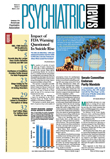Clinicians who ask recovering alcoholics with insomnia about continuing sleep problems are taking a step that may help prevent alcoholic patients from relapsing. This finding arises from a 12-week study funded by the National Institute on Alcohol Abuse and Alcoholism that suggested that sleep problems contributed to relapse among alcoholics in recovery.
In addition, the alcoholic patients' subjective estimates of the quality of their sleep predicted future drinking better than did objective measures alone.
“Patients with the biggest disconnect between their perception of how they slept and their actual sleep patterns were most likely to relapse,” Deirdre Conroy, Ph.D., told Psychiatric News.
“This indicates that long-term drinking interferes with both sleep and perception of sleep, and if sleep problems are not addressed, the risk of relapse may be high,” said Conroy, a fellow at the University of Michigan's Addiction Research Center.
Conroy headed a study of recovering alcoholic insomniacs in collaboration with members of the University of Michigan's Department of Psychiatry and others. Their report appears in the December 2006 Alcoholism: Clinical and Experimental Research.
The researchers evaluated sleep, sleep perception, and alcohol relapse in 21 men and women with a mean age of 44.6 who were in the early stages of alcohol recovery. All suffered from insomnia and had abstained from alcohol for at least one week before enrollment in the study. All had two nights of polysomnography (PSG) sleep studies three weeks apart. After each PSG session, they were asked how they slept, how long they thought it took them to fall asleep, and how long they were awake during the night. Then during two six-week periods, one the treatment phase and the other a posttreatment follow-up, the researchers questioned the subjects on how much they drank.
When the PSG results were compared with the volunteers' subjective views of how they had slept, 72 percent of them overestimated by an average of 21 minutes how long it had taken them to fall asleep. And 89 percent underestimated by about 49 minutes how long they had been awake during the night. During the first six-week follow-up period, the amount of alcohol that subjects consumed was predicted by self-reported estimations of wakefulness in the middle of the night and also by PSG study results. During the second six-week period, drinking was predicted by both subjective estimations of sleep and rapid eye movement sleep latency.
Since perceptions of how the volunteers slept were actually more accurate in predicting their potential for relapse than were sleep-lab measurements, Conroy believes that normalization of PSG in the presence of persisting sleep complaints may be an insufficient goal of treatment.
She said that during early recovery from alcoholism, people think that it takes them a long time to fall asleep and that once they did fall asleep, they slept through the night. The reality is it did not take them as long to fall asleep as they thought it did, and their brain was awake for a large portion of the night.
“An alcoholic in early recovery has a lot of wakefulness in the night but is not necessarily picking up on this,” Conroy said. “So it is important for clinicians working with the alcohol-dependent patient to have a differential of poor sleep quality in the back of their mind as a potential challenge for the patient throughout alcohol recovery.”
Poor sleep quality can lead to mood disturbances, so if recovering alcoholics are irritable because they are not getting quality sleep at night, they might be more vulnerable to relapse, she added.
An abstract of “Perception of Sleep in Recovering Alcohol-Dependent Patients With Insomnia: Relationship With Future Drinking” is posted at<www.blackwell-synergy.com/doi/abs/10.1111/j.1530-0277.2006.00245.x>.▪
